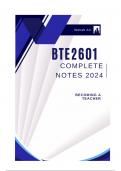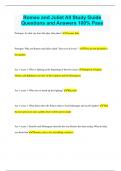,Course Title: BTE2601 - Becoming a Teacher
Course Description:
BTE2601 is designed to introduce students to the teaching profession. The course
covers the foundational aspects of education, including the role and responsibilities of a
teacher, educational theories, classroom management, lesson planning, assessment
strategies, and reflective practice. By the end of the course, students will have a
comprehensive understanding of what it means to be an effective and reflective
educator.
Course Objectives:
1. To understand the role and responsibilities of a teacher.
2. To explore various educational theories and their application in the classroom.
3. To develop effective classroom management strategies.
4. To design and implement lesson plans.
5. To assess student learning using a variety of methods.
6. To engage in reflective practice for continuous professional development.
Weekly Topics and Activities:
Week 1: Introduction to the Teaching Profession
● Overview of the course and expectations.
● The role and responsibilities of a teacher.
● Ethical considerations in teaching.
● Activities: Class discussion on the qualities of an effective teacher, reflective
writing on personal motivations for becoming a teacher.
Week 2: Historical and Philosophical Foundations of Education
● Key educational philosophies: Essentialism, Progressivism, Perennialism, and
Social Reconstructionism.
● Historical influences on modern education.
● Activities: Group presentations on different educational philosophies, reading and
analysis of historical texts.
,Week 3: Educational Theories and Their Application
● Behaviorism, Constructivism, and Cognitivism.
● Applying theories in classroom settings.
● Activities: Case studies, developing lesson plans based on different theories.
Week 4: Classroom Management
● Strategies for effective classroom management.
● Building a positive classroom environment.
● Dealing with challenging behavior.
● Activities: Role-playing scenarios, creating a classroom management plan.
Week 5: Lesson Planning
● Components of a lesson plan.
● Setting learning objectives.
● Differentiating instruction.
● Activities: Workshop on writing lesson plans, peer review of lesson plans.
Week 6: Assessment and Evaluation
● Types of assessments: formative, summative, diagnostic, and ipsative.
● Creating and using rubrics.
● Providing feedback.
● Activities: Designing assessment tools, mock assessments, and feedback
sessions.
Week 7: Inclusive Education
● Understanding diversity in the classroom.
● Strategies for supporting students with special needs.
● Culturally responsive teaching.
● Activities: Guest lectures from special education professionals, case studies on
inclusive education.
, Week 8: Technology in Education
● Integrating technology into teaching and learning.
● Digital literacy and e-learning tools.
● Ethical use of technology.
● Activities: Hands-on workshops with educational technology tools, creating
digital lesson plans.
Week 9: Professional Development
● Reflective practice and continuous improvement.
● Professional learning communities.
● Staying current with educational research.
● Activities: Developing a professional development plan, journal writing on
reflective practices.
Week 10: Capstone Project
● Designing a comprehensive teaching unit.
● Implementing and reflecting on the teaching unit.
● Activities: Presentation of the teaching unit, peer and instructor feedback, final
reflection paper.
Assessment Methods:
● Participation and Attendance: 10%
● Reflective Journals: 20%
● Lesson Plans: 20%
● Group Projects/Presentations: 20%
● Capstone Project: 30%
Recommended Reading:
1. "The First Days of School: How to Be an Effective Teacher" by Harry K. Wong and
Rosemary T. Wong.
2. "Educational Psychology: Theory and Practice" by Robert E. Slavin.





